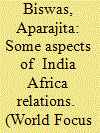| Srl | Item |
| 1 |
ID:
130637


|
|
|
|
|
| Publication |
2014.
|
| Summary/Abstract |
The Third World countries, represented by China, have been making great efforts to
promote democratization of international relations since the beginning of the 21st
century, which is of great theoretical and practical significance. Chinese academia should
extend and strengthen its researches on this issue through diversified perspectives and
ways.
|
|
|
|
|
|
|
|
|
|
|
|
|
|
|
|
| 2 |
ID:
116038


|
|
|
| 3 |
ID:
107175


|
|
|
| 4 |
ID:
093322


|
|
|
|
|
| Publication |
2009.
|
| Summary/Abstract |
At the India-Africa Forum Summit, New Delhi, hosted by India in April 2008 and attended by the heads of state of 14 countries and representatives from the African Union (AU), two agreements were adopted.
|
|
|
|
|
|
|
|
|
|
|
|
|
|
|
|
| 5 |
ID:
130720


|
|
|
|
|
| Publication |
2014.
|
| Summary/Abstract |
Democracy has spread spontaneously and swiftly in an area of the world generally thought to be immune to political changes: West Asia and North Africa (WANA). An incident of common occurrence in Third World countries-a policeman extorting money from a fruit vendor-sparked this surge for democracy, which spread rapidly from the Mediterranean to the Red Sea in some two months. On December 17, 2010, a fruit vendor, Mohammed Razzack, set himself on fire to protest against a policeman extorting money from him. From Tunisia to Egypt (which witnessed the end of the 33-year military dictatorship) the surge for democracy spread to Yemen (another seat of repressive military dictatorship). From the Mediterranean to the Red Sea was the geographic spread of this sweep-a rare occurrence in history.
History has recorded some such wide political sweeps. The 1848 second revolution began in Paris and reached St. Petersburg, Russia, in a few short months, sweeping away the authoritarian monarchies of Central Europe and severely shaking the Czarist autocracy. Remarkable was the democratic upsurge that led to the fall of the old Stalinist dictatorship in East Europe; Communist Party dictatorships crumbled in Poland, Hungary and Czechoslovakia. The Berlin Wall was dismantled peacefully by the German people in November 1989. The deadliest Cold War confrontation in history ended most peacefully.
|
|
|
|
|
|
|
|
|
|
|
|
|
|
|
|
| 6 |
ID:
049664


|
|
|
|
|
| Publication |
Oxford, Oxford University Press, 1997.
|
| Description |
x, 425p.
|
| Standard Number |
041957
|
|
|
|
|
|
|
|
|
|
|
|
Copies: C:1/I:0,R:0,Q:0
Circulation
| Accession# | Call# | Current Location | Status | Policy | Location |
| 041957 | 327.16/GAD 041957 | Main | On Shelf | General | |
|
|
|
|